Hospitality Business Toolkit: Managing Finance, HR, and Legal Aspects
VerifiedAdded on 2023/06/13
|19
|4351
|467
Report
AI Summary
This report analyzes the hospitality business toolkit, focusing on finance, HR, and legal aspects within Travelodge Hotel. It investigates financial management, transaction recording to minimize costs, and the importance of source documents. The report also reviews the HR life cycle, talent acquisition and retention strategies, and the impact of employment and contract law on business decisions. Furthermore, it examines organizational communication, departmental integration, and ethical considerations in the hospitality sector, providing recommendations for effective financial management, HR practices, and operational coordination. This resource is available on Desklib, offering students access to past papers and solved assignments.
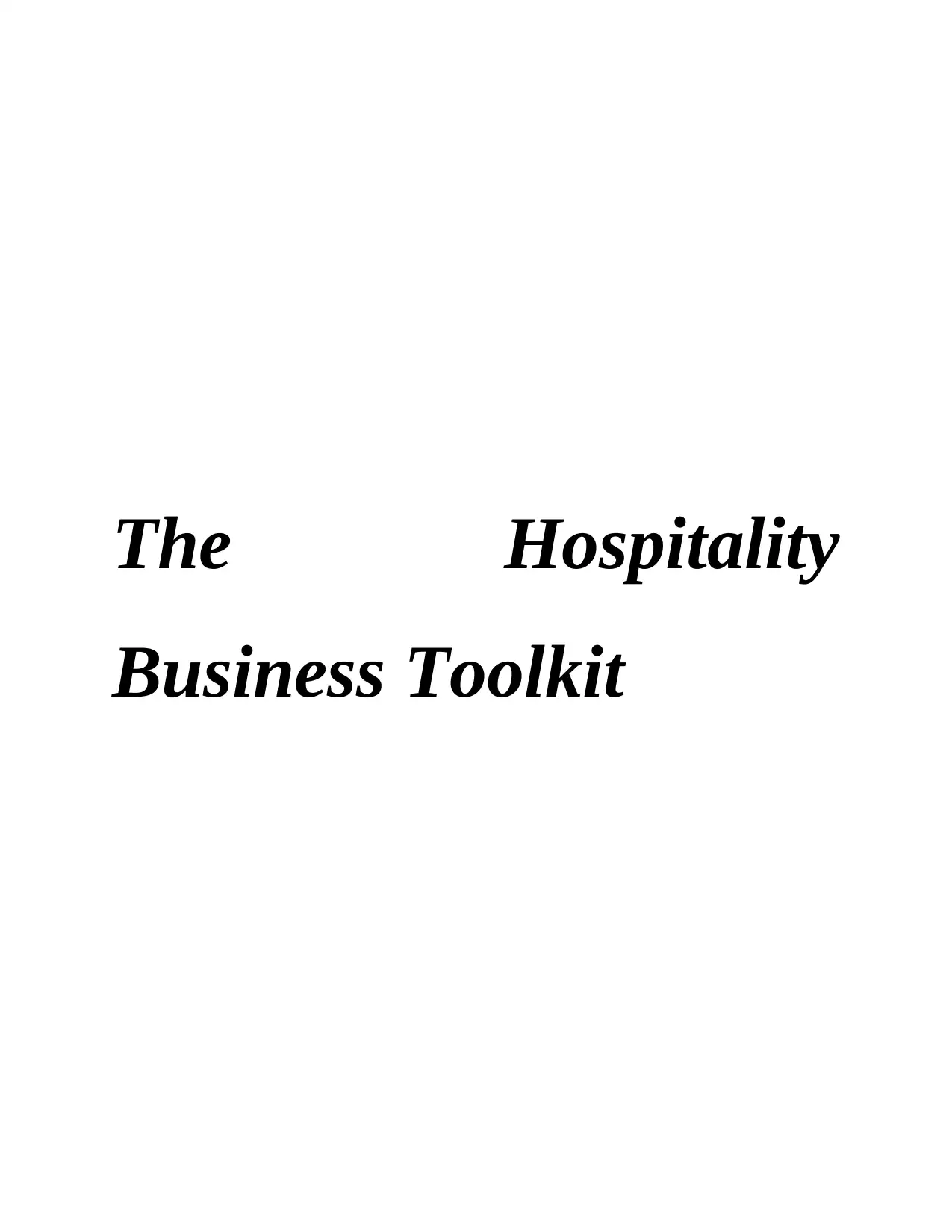
The Hospitality
Business Toolkit
Business Toolkit
Paraphrase This Document
Need a fresh take? Get an instant paraphrase of this document with our AI Paraphraser
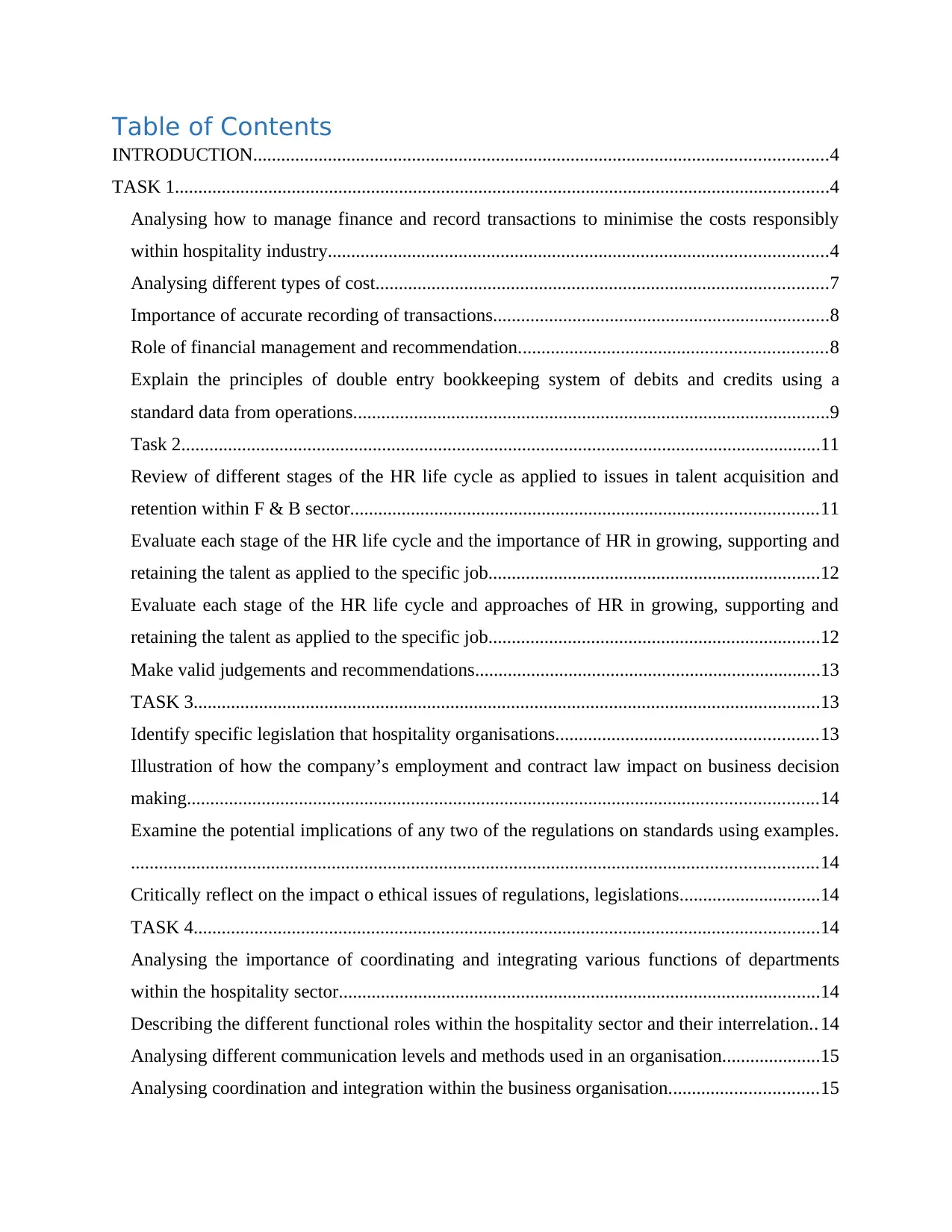
Table of Contents
INTRODUCTION...........................................................................................................................4
TASK 1............................................................................................................................................4
Analysing how to manage finance and record transactions to minimise the costs responsibly
within hospitality industry...........................................................................................................4
Analysing different types of cost.................................................................................................7
Importance of accurate recording of transactions........................................................................8
Role of financial management and recommendation..................................................................8
Explain the principles of double entry bookkeeping system of debits and credits using a
standard data from operations......................................................................................................9
Task 2.........................................................................................................................................11
Review of different stages of the HR life cycle as applied to issues in talent acquisition and
retention within F & B sector....................................................................................................11
Evaluate each stage of the HR life cycle and the importance of HR in growing, supporting and
retaining the talent as applied to the specific job.......................................................................12
Evaluate each stage of the HR life cycle and approaches of HR in growing, supporting and
retaining the talent as applied to the specific job.......................................................................12
Make valid judgements and recommendations..........................................................................13
TASK 3......................................................................................................................................13
Identify specific legislation that hospitality organisations........................................................13
Illustration of how the company’s employment and contract law impact on business decision
making.......................................................................................................................................14
Examine the potential implications of any two of the regulations on standards using examples.
...................................................................................................................................................14
Critically reflect on the impact o ethical issues of regulations, legislations..............................14
TASK 4......................................................................................................................................14
Analysing the importance of coordinating and integrating various functions of departments
within the hospitality sector.......................................................................................................14
Describing the different functional roles within the hospitality sector and their interrelation.. 14
Analysing different communication levels and methods used in an organisation.....................15
Analysing coordination and integration within the business organisation................................15
INTRODUCTION...........................................................................................................................4
TASK 1............................................................................................................................................4
Analysing how to manage finance and record transactions to minimise the costs responsibly
within hospitality industry...........................................................................................................4
Analysing different types of cost.................................................................................................7
Importance of accurate recording of transactions........................................................................8
Role of financial management and recommendation..................................................................8
Explain the principles of double entry bookkeeping system of debits and credits using a
standard data from operations......................................................................................................9
Task 2.........................................................................................................................................11
Review of different stages of the HR life cycle as applied to issues in talent acquisition and
retention within F & B sector....................................................................................................11
Evaluate each stage of the HR life cycle and the importance of HR in growing, supporting and
retaining the talent as applied to the specific job.......................................................................12
Evaluate each stage of the HR life cycle and approaches of HR in growing, supporting and
retaining the talent as applied to the specific job.......................................................................12
Make valid judgements and recommendations..........................................................................13
TASK 3......................................................................................................................................13
Identify specific legislation that hospitality organisations........................................................13
Illustration of how the company’s employment and contract law impact on business decision
making.......................................................................................................................................14
Examine the potential implications of any two of the regulations on standards using examples.
...................................................................................................................................................14
Critically reflect on the impact o ethical issues of regulations, legislations..............................14
TASK 4......................................................................................................................................14
Analysing the importance of coordinating and integrating various functions of departments
within the hospitality sector.......................................................................................................14
Describing the different functional roles within the hospitality sector and their interrelation.. 14
Analysing different communication levels and methods used in an organisation.....................15
Analysing coordination and integration within the business organisation................................15
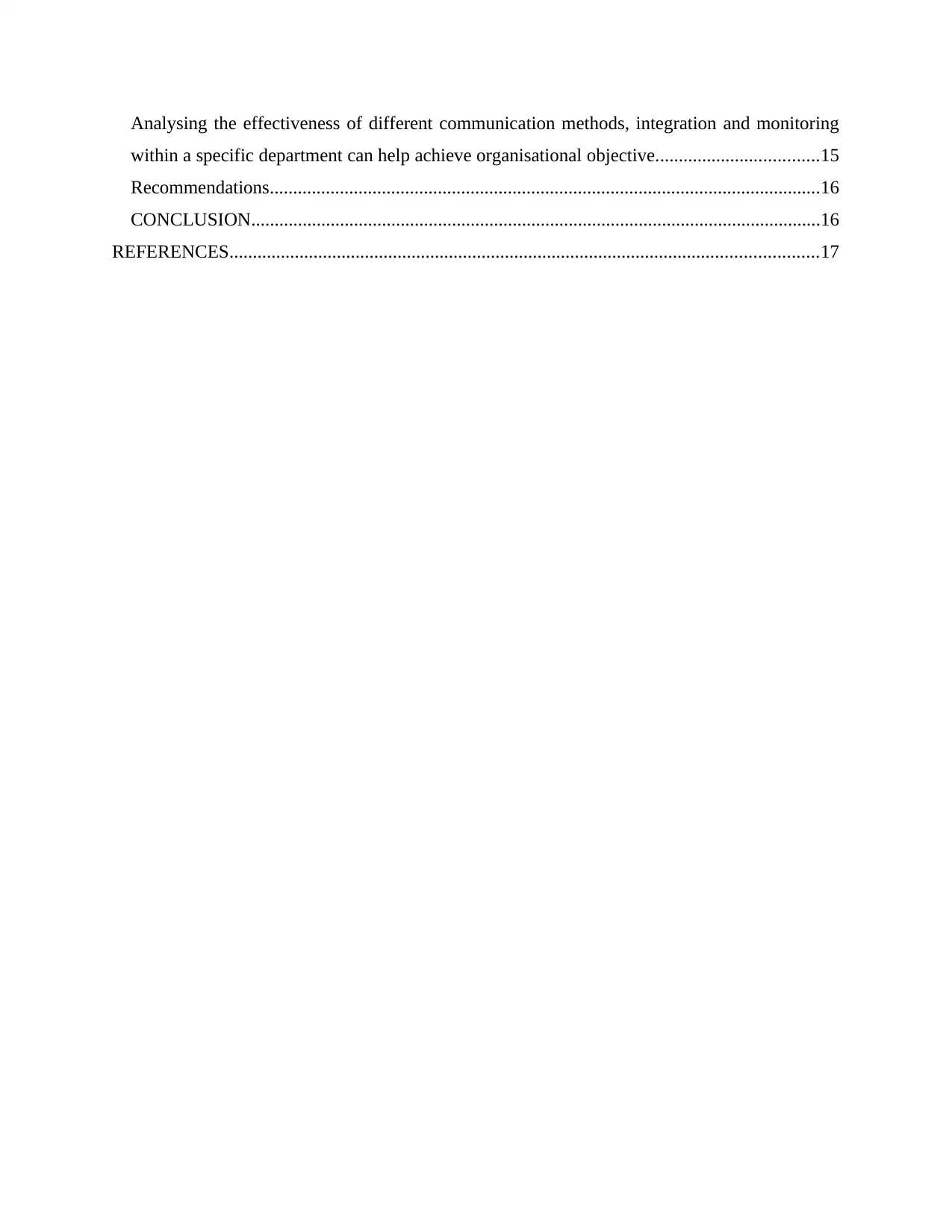
Analysing the effectiveness of different communication methods, integration and monitoring
within a specific department can help achieve organisational objective...................................15
Recommendations......................................................................................................................16
CONCLUSION..........................................................................................................................16
REFERENCES..............................................................................................................................17
within a specific department can help achieve organisational objective...................................15
Recommendations......................................................................................................................16
CONCLUSION..........................................................................................................................16
REFERENCES..............................................................................................................................17
⊘ This is a preview!⊘
Do you want full access?
Subscribe today to unlock all pages.

Trusted by 1+ million students worldwide
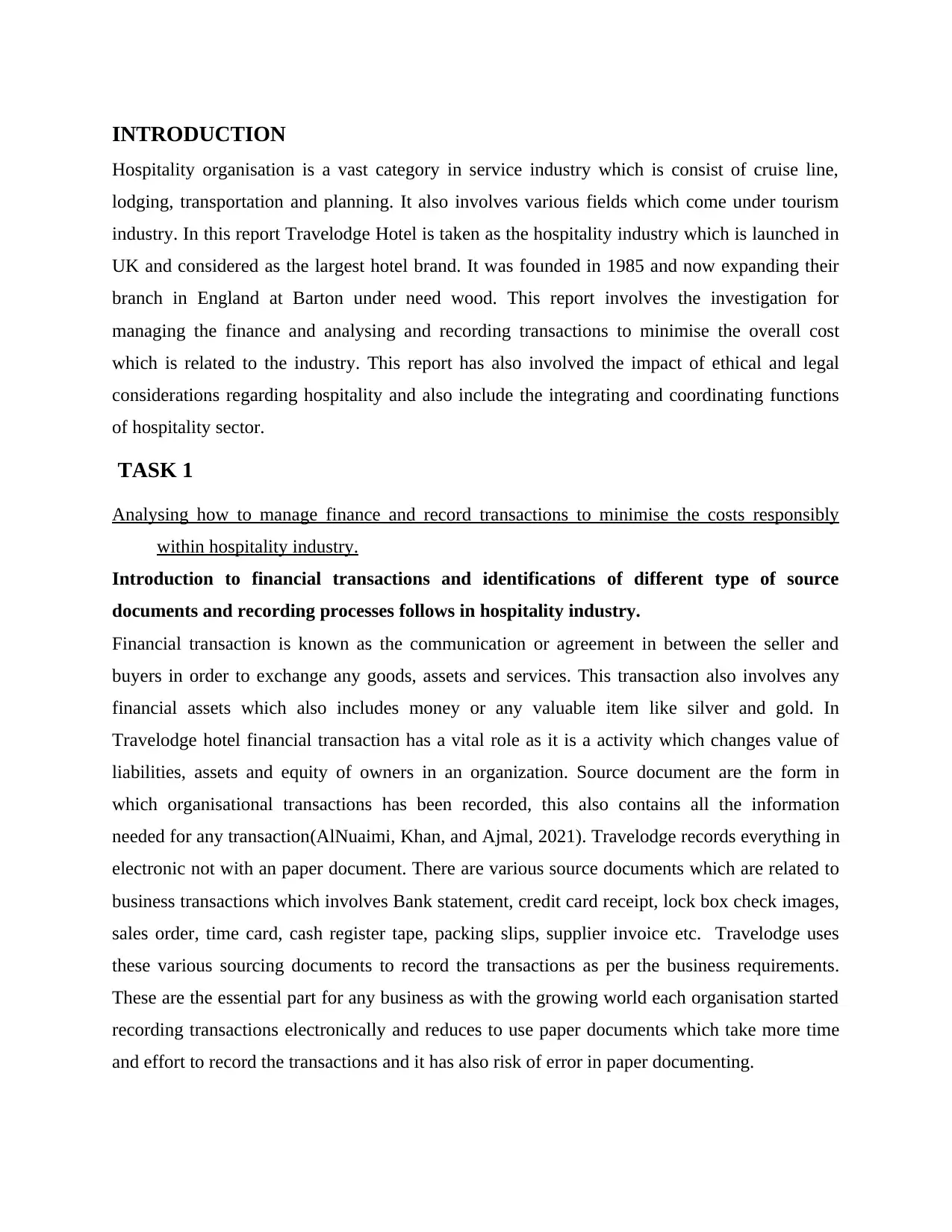
INTRODUCTION
Hospitality organisation is a vast category in service industry which is consist of cruise line,
lodging, transportation and planning. It also involves various fields which come under tourism
industry. In this report Travelodge Hotel is taken as the hospitality industry which is launched in
UK and considered as the largest hotel brand. It was founded in 1985 and now expanding their
branch in England at Barton under need wood. This report involves the investigation for
managing the finance and analysing and recording transactions to minimise the overall cost
which is related to the industry. This report has also involved the impact of ethical and legal
considerations regarding hospitality and also include the integrating and coordinating functions
of hospitality sector.
TASK 1
Analysing how to manage finance and record transactions to minimise the costs responsibly
within hospitality industry.
Introduction to financial transactions and identifications of different type of source
documents and recording processes follows in hospitality industry.
Financial transaction is known as the communication or agreement in between the seller and
buyers in order to exchange any goods, assets and services. This transaction also involves any
financial assets which also includes money or any valuable item like silver and gold. In
Travelodge hotel financial transaction has a vital role as it is a activity which changes value of
liabilities, assets and equity of owners in an organization. Source document are the form in
which organisational transactions has been recorded, this also contains all the information
needed for any transaction(AlNuaimi, Khan, and Ajmal, 2021). Travelodge records everything in
electronic not with an paper document. There are various source documents which are related to
business transactions which involves Bank statement, credit card receipt, lock box check images,
sales order, time card, cash register tape, packing slips, supplier invoice etc. Travelodge uses
these various sourcing documents to record the transactions as per the business requirements.
These are the essential part for any business as with the growing world each organisation started
recording transactions electronically and reduces to use paper documents which take more time
and effort to record the transactions and it has also risk of error in paper documenting.
Hospitality organisation is a vast category in service industry which is consist of cruise line,
lodging, transportation and planning. It also involves various fields which come under tourism
industry. In this report Travelodge Hotel is taken as the hospitality industry which is launched in
UK and considered as the largest hotel brand. It was founded in 1985 and now expanding their
branch in England at Barton under need wood. This report involves the investigation for
managing the finance and analysing and recording transactions to minimise the overall cost
which is related to the industry. This report has also involved the impact of ethical and legal
considerations regarding hospitality and also include the integrating and coordinating functions
of hospitality sector.
TASK 1
Analysing how to manage finance and record transactions to minimise the costs responsibly
within hospitality industry.
Introduction to financial transactions and identifications of different type of source
documents and recording processes follows in hospitality industry.
Financial transaction is known as the communication or agreement in between the seller and
buyers in order to exchange any goods, assets and services. This transaction also involves any
financial assets which also includes money or any valuable item like silver and gold. In
Travelodge hotel financial transaction has a vital role as it is a activity which changes value of
liabilities, assets and equity of owners in an organization. Source document are the form in
which organisational transactions has been recorded, this also contains all the information
needed for any transaction(AlNuaimi, Khan, and Ajmal, 2021). Travelodge records everything in
electronic not with an paper document. There are various source documents which are related to
business transactions which involves Bank statement, credit card receipt, lock box check images,
sales order, time card, cash register tape, packing slips, supplier invoice etc. Travelodge uses
these various sourcing documents to record the transactions as per the business requirements.
These are the essential part for any business as with the growing world each organisation started
recording transactions electronically and reduces to use paper documents which take more time
and effort to record the transactions and it has also risk of error in paper documenting.
Paraphrase This Document
Need a fresh take? Get an instant paraphrase of this document with our AI Paraphraser
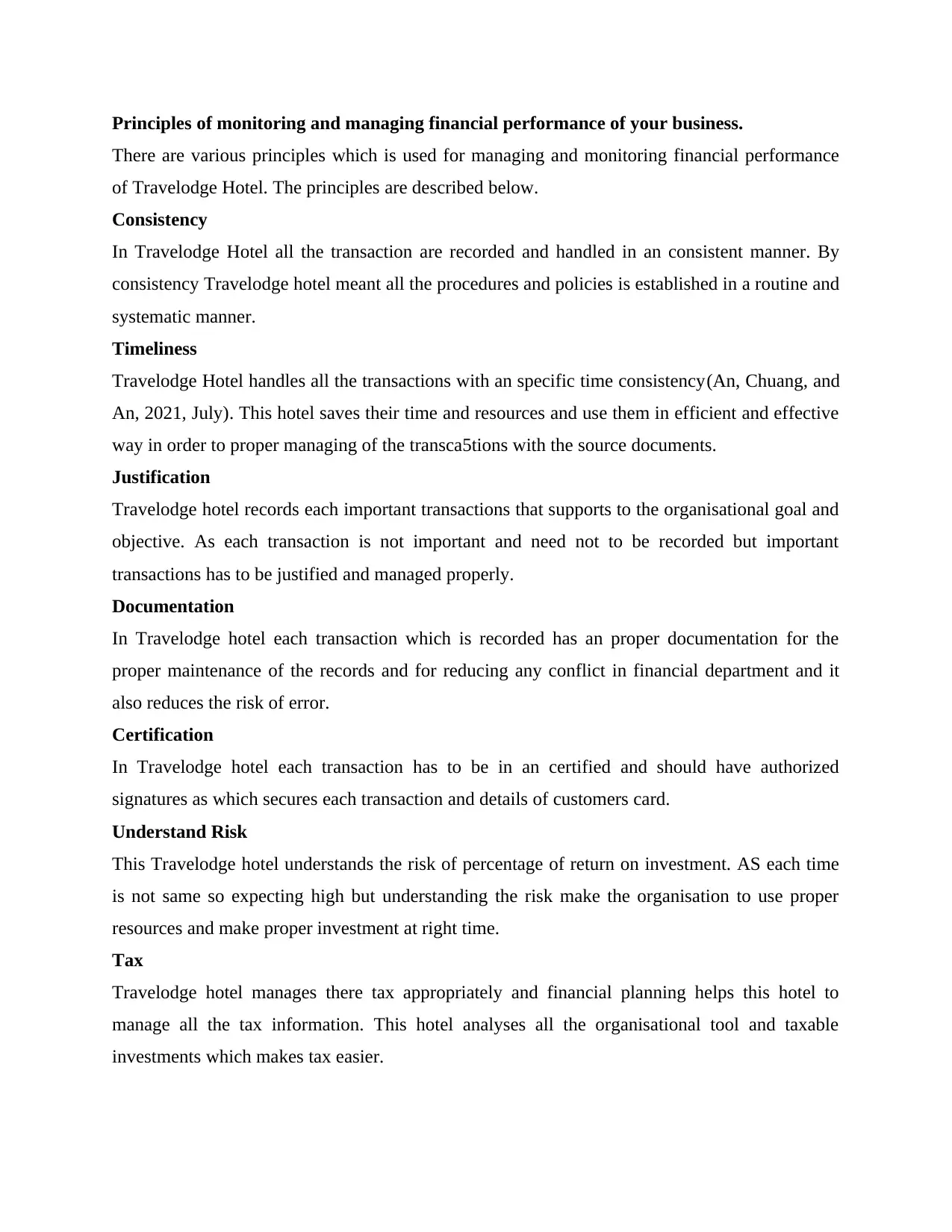
Principles of monitoring and managing financial performance of your business.
There are various principles which is used for managing and monitoring financial performance
of Travelodge Hotel. The principles are described below.
Consistency
In Travelodge Hotel all the transaction are recorded and handled in an consistent manner. By
consistency Travelodge hotel meant all the procedures and policies is established in a routine and
systematic manner.
Timeliness
Travelodge Hotel handles all the transactions with an specific time consistency(An, Chuang, and
An, 2021, July). This hotel saves their time and resources and use them in efficient and effective
way in order to proper managing of the transca5tions with the source documents.
Justification
Travelodge hotel records each important transactions that supports to the organisational goal and
objective. As each transaction is not important and need not to be recorded but important
transactions has to be justified and managed properly.
Documentation
In Travelodge hotel each transaction which is recorded has an proper documentation for the
proper maintenance of the records and for reducing any conflict in financial department and it
also reduces the risk of error.
Certification
In Travelodge hotel each transaction has to be in an certified and should have authorized
signatures as which secures each transaction and details of customers card.
Understand Risk
This Travelodge hotel understands the risk of percentage of return on investment. AS each time
is not same so expecting high but understanding the risk make the organisation to use proper
resources and make proper investment at right time.
Tax
Travelodge hotel manages there tax appropriately and financial planning helps this hotel to
manage all the tax information. This hotel analyses all the organisational tool and taxable
investments which makes tax easier.
There are various principles which is used for managing and monitoring financial performance
of Travelodge Hotel. The principles are described below.
Consistency
In Travelodge Hotel all the transaction are recorded and handled in an consistent manner. By
consistency Travelodge hotel meant all the procedures and policies is established in a routine and
systematic manner.
Timeliness
Travelodge Hotel handles all the transactions with an specific time consistency(An, Chuang, and
An, 2021, July). This hotel saves their time and resources and use them in efficient and effective
way in order to proper managing of the transca5tions with the source documents.
Justification
Travelodge hotel records each important transactions that supports to the organisational goal and
objective. As each transaction is not important and need not to be recorded but important
transactions has to be justified and managed properly.
Documentation
In Travelodge hotel each transaction which is recorded has an proper documentation for the
proper maintenance of the records and for reducing any conflict in financial department and it
also reduces the risk of error.
Certification
In Travelodge hotel each transaction has to be in an certified and should have authorized
signatures as which secures each transaction and details of customers card.
Understand Risk
This Travelodge hotel understands the risk of percentage of return on investment. AS each time
is not same so expecting high but understanding the risk make the organisation to use proper
resources and make proper investment at right time.
Tax
Travelodge hotel manages there tax appropriately and financial planning helps this hotel to
manage all the tax information. This hotel analyses all the organisational tool and taxable
investments which makes tax easier.
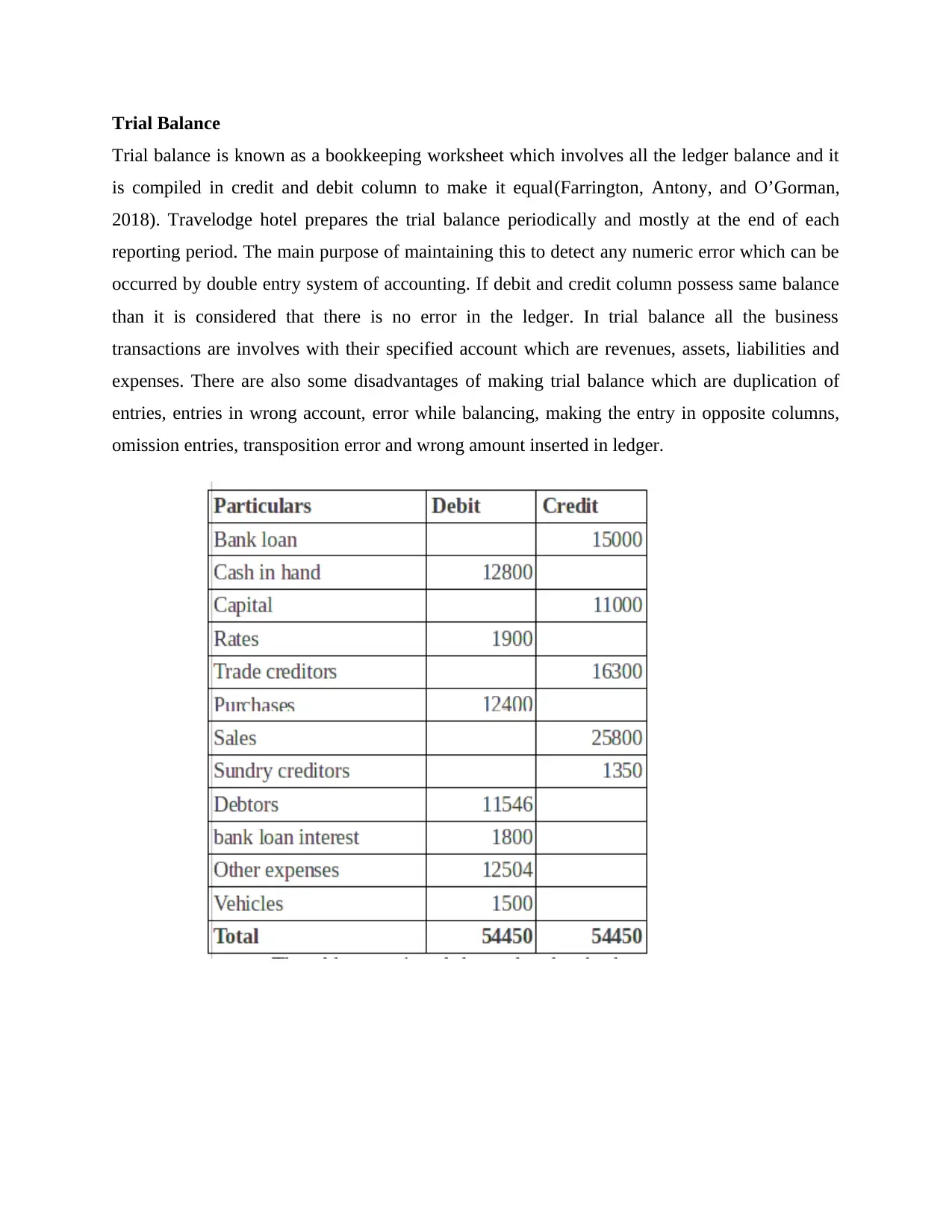
Trial Balance
Trial balance is known as a bookkeeping worksheet which involves all the ledger balance and it
is compiled in credit and debit column to make it equal(Farrington, Antony, and O’Gorman,
2018). Travelodge hotel prepares the trial balance periodically and mostly at the end of each
reporting period. The main purpose of maintaining this to detect any numeric error which can be
occurred by double entry system of accounting. If debit and credit column possess same balance
than it is considered that there is no error in the ledger. In trial balance all the business
transactions are involves with their specified account which are revenues, assets, liabilities and
expenses. There are also some disadvantages of making trial balance which are duplication of
entries, entries in wrong account, error while balancing, making the entry in opposite columns,
omission entries, transposition error and wrong amount inserted in ledger.
Trial balance is known as a bookkeeping worksheet which involves all the ledger balance and it
is compiled in credit and debit column to make it equal(Farrington, Antony, and O’Gorman,
2018). Travelodge hotel prepares the trial balance periodically and mostly at the end of each
reporting period. The main purpose of maintaining this to detect any numeric error which can be
occurred by double entry system of accounting. If debit and credit column possess same balance
than it is considered that there is no error in the ledger. In trial balance all the business
transactions are involves with their specified account which are revenues, assets, liabilities and
expenses. There are also some disadvantages of making trial balance which are duplication of
entries, entries in wrong account, error while balancing, making the entry in opposite columns,
omission entries, transposition error and wrong amount inserted in ledger.
⊘ This is a preview!⊘
Do you want full access?
Subscribe today to unlock all pages.

Trusted by 1+ million students worldwide
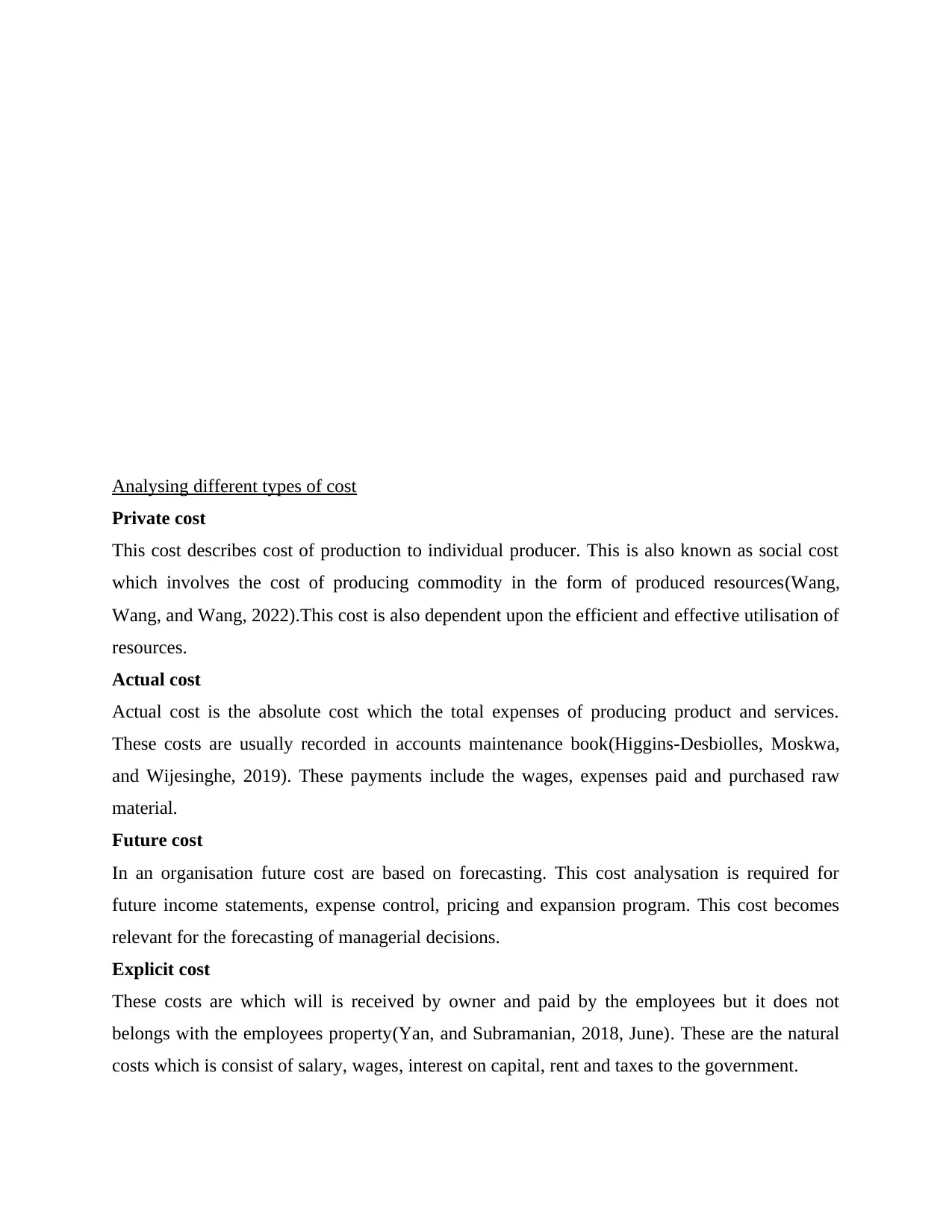
Analysing different types of cost
Private cost
This cost describes cost of production to individual producer. This is also known as social cost
which involves the cost of producing commodity in the form of produced resources(Wang,
Wang, and Wang, 2022).This cost is also dependent upon the efficient and effective utilisation of
resources.
Actual cost
Actual cost is the absolute cost which the total expenses of producing product and services.
These costs are usually recorded in accounts maintenance book(Higgins-Desbiolles, Moskwa,
and Wijesinghe, 2019). These payments include the wages, expenses paid and purchased raw
material.
Future cost
In an organisation future cost are based on forecasting. This cost analysation is required for
future income statements, expense control, pricing and expansion program. This cost becomes
relevant for the forecasting of managerial decisions.
Explicit cost
These costs are which will is received by owner and paid by the employees but it does not
belongs with the employees property(Yan, and Subramanian, 2018, June). These are the natural
costs which is consist of salary, wages, interest on capital, rent and taxes to the government.
Private cost
This cost describes cost of production to individual producer. This is also known as social cost
which involves the cost of producing commodity in the form of produced resources(Wang,
Wang, and Wang, 2022).This cost is also dependent upon the efficient and effective utilisation of
resources.
Actual cost
Actual cost is the absolute cost which the total expenses of producing product and services.
These costs are usually recorded in accounts maintenance book(Higgins-Desbiolles, Moskwa,
and Wijesinghe, 2019). These payments include the wages, expenses paid and purchased raw
material.
Future cost
In an organisation future cost are based on forecasting. This cost analysation is required for
future income statements, expense control, pricing and expansion program. This cost becomes
relevant for the forecasting of managerial decisions.
Explicit cost
These costs are which will is received by owner and paid by the employees but it does not
belongs with the employees property(Yan, and Subramanian, 2018, June). These are the natural
costs which is consist of salary, wages, interest on capital, rent and taxes to the government.
Paraphrase This Document
Need a fresh take? Get an instant paraphrase of this document with our AI Paraphraser
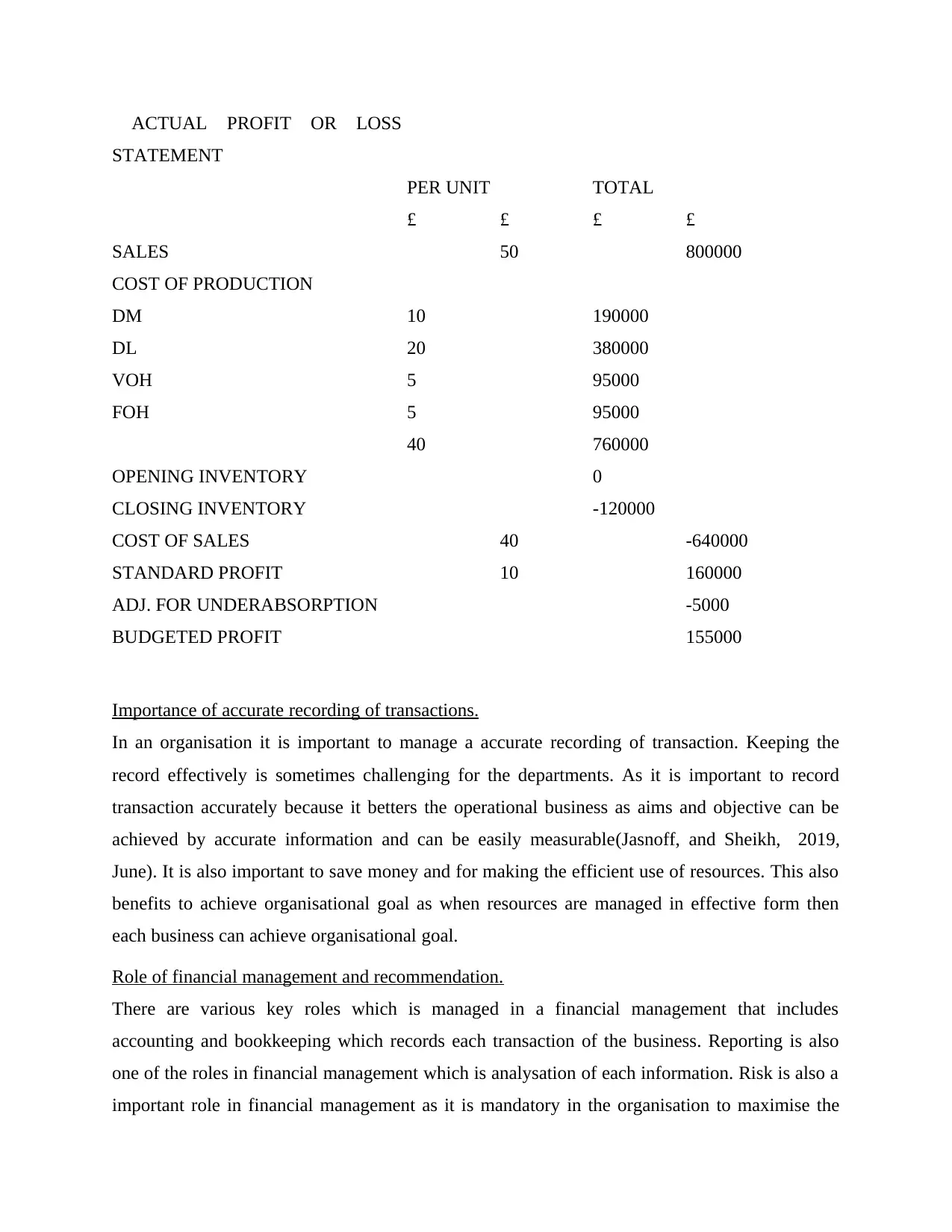
ACTUAL PROFIT OR LOSS
STATEMENT
PER UNIT TOTAL
£ £ £ £
SALES 50 800000
COST OF PRODUCTION
DM 10 190000
DL 20 380000
VOH 5 95000
FOH 5 95000
40 760000
OPENING INVENTORY 0
CLOSING INVENTORY -120000
COST OF SALES 40 -640000
STANDARD PROFIT 10 160000
ADJ. FOR UNDERABSORPTION -5000
BUDGETED PROFIT 155000
Importance of accurate recording of transactions.
In an organisation it is important to manage a accurate recording of transaction. Keeping the
record effectively is sometimes challenging for the departments. As it is important to record
transaction accurately because it betters the operational business as aims and objective can be
achieved by accurate information and can be easily measurable(Jasnoff, and Sheikh, 2019,
June). It is also important to save money and for making the efficient use of resources. This also
benefits to achieve organisational goal as when resources are managed in effective form then
each business can achieve organisational goal.
Role of financial management and recommendation.
There are various key roles which is managed in a financial management that includes
accounting and bookkeeping which records each transaction of the business. Reporting is also
one of the roles in financial management which is analysation of each information. Risk is also a
important role in financial management as it is mandatory in the organisation to maximise the
STATEMENT
PER UNIT TOTAL
£ £ £ £
SALES 50 800000
COST OF PRODUCTION
DM 10 190000
DL 20 380000
VOH 5 95000
FOH 5 95000
40 760000
OPENING INVENTORY 0
CLOSING INVENTORY -120000
COST OF SALES 40 -640000
STANDARD PROFIT 10 160000
ADJ. FOR UNDERABSORPTION -5000
BUDGETED PROFIT 155000
Importance of accurate recording of transactions.
In an organisation it is important to manage a accurate recording of transaction. Keeping the
record effectively is sometimes challenging for the departments. As it is important to record
transaction accurately because it betters the operational business as aims and objective can be
achieved by accurate information and can be easily measurable(Jasnoff, and Sheikh, 2019,
June). It is also important to save money and for making the efficient use of resources. This also
benefits to achieve organisational goal as when resources are managed in effective form then
each business can achieve organisational goal.
Role of financial management and recommendation.
There are various key roles which is managed in a financial management that includes
accounting and bookkeeping which records each transaction of the business. Reporting is also
one of the roles in financial management which is analysation of each information. Risk is also a
important role in financial management as it is mandatory in the organisation to maximise the
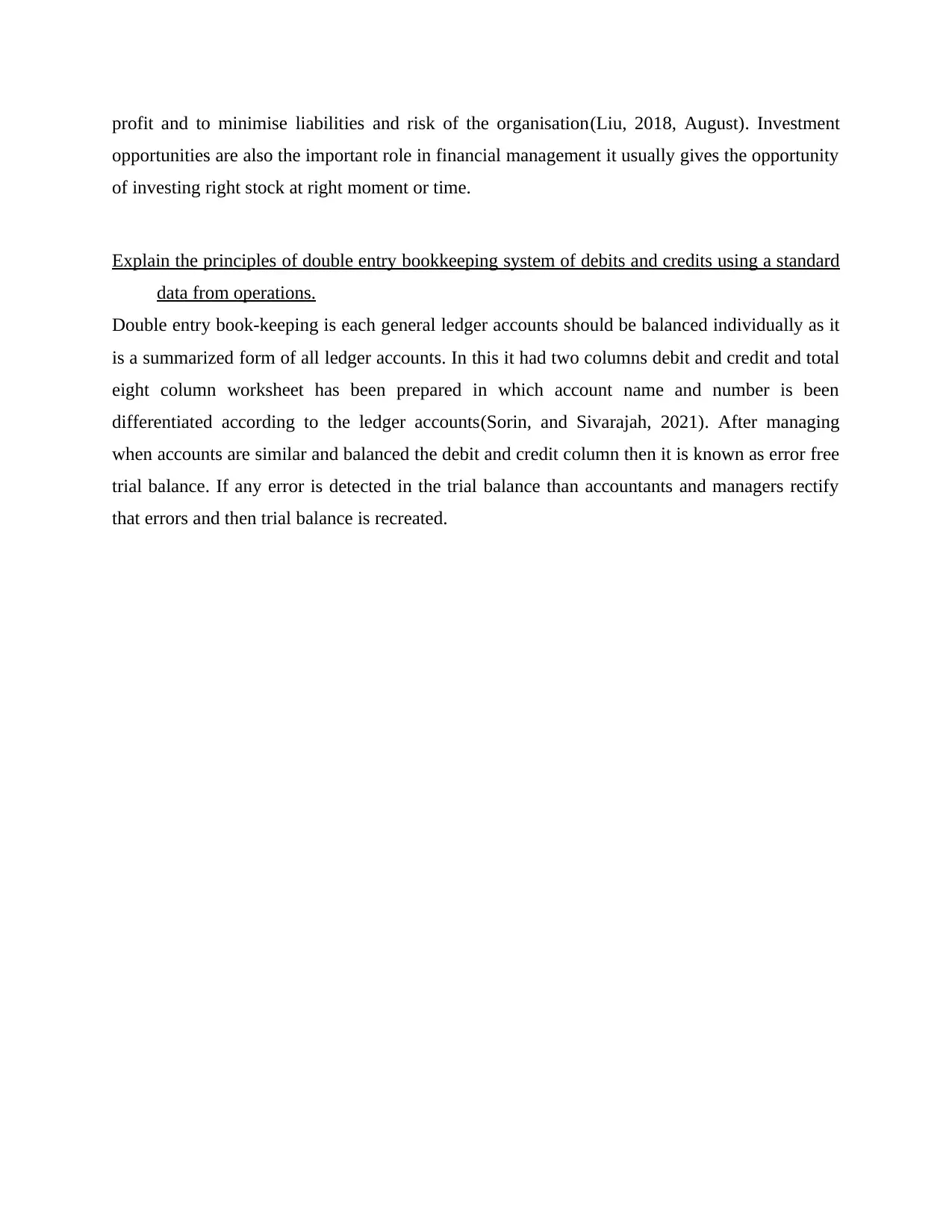
profit and to minimise liabilities and risk of the organisation(Liu, 2018, August). Investment
opportunities are also the important role in financial management it usually gives the opportunity
of investing right stock at right moment or time.
Explain the principles of double entry bookkeeping system of debits and credits using a standard
data from operations.
Double entry book-keeping is each general ledger accounts should be balanced individually as it
is a summarized form of all ledger accounts. In this it had two columns debit and credit and total
eight column worksheet has been prepared in which account name and number is been
differentiated according to the ledger accounts(Sorin, and Sivarajah, 2021). After managing
when accounts are similar and balanced the debit and credit column then it is known as error free
trial balance. If any error is detected in the trial balance than accountants and managers rectify
that errors and then trial balance is recreated.
opportunities are also the important role in financial management it usually gives the opportunity
of investing right stock at right moment or time.
Explain the principles of double entry bookkeeping system of debits and credits using a standard
data from operations.
Double entry book-keeping is each general ledger accounts should be balanced individually as it
is a summarized form of all ledger accounts. In this it had two columns debit and credit and total
eight column worksheet has been prepared in which account name and number is been
differentiated according to the ledger accounts(Sorin, and Sivarajah, 2021). After managing
when accounts are similar and balanced the debit and credit column then it is known as error free
trial balance. If any error is detected in the trial balance than accountants and managers rectify
that errors and then trial balance is recreated.
⊘ This is a preview!⊘
Do you want full access?
Subscribe today to unlock all pages.

Trusted by 1+ million students worldwide
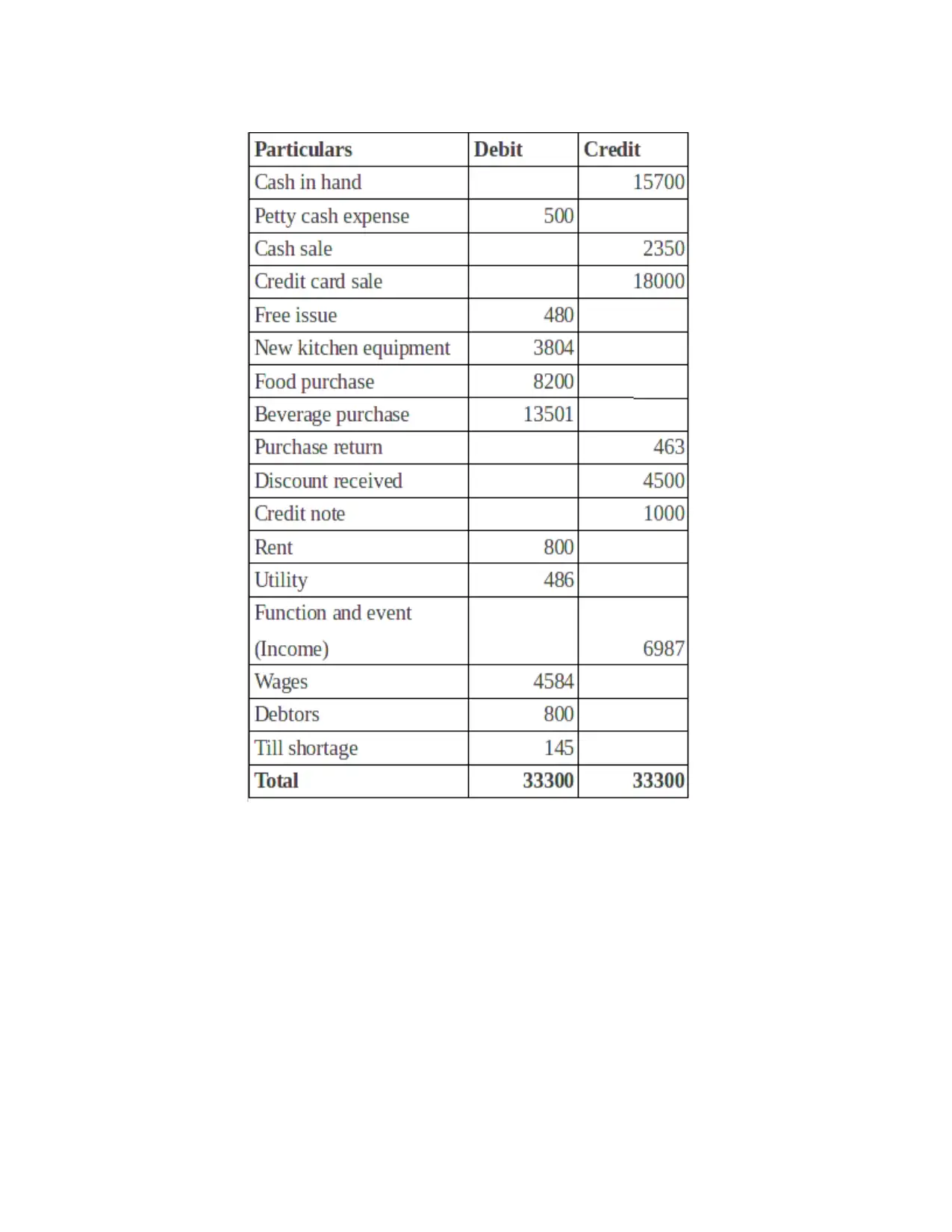
Paraphrase This Document
Need a fresh take? Get an instant paraphrase of this document with our AI Paraphraser
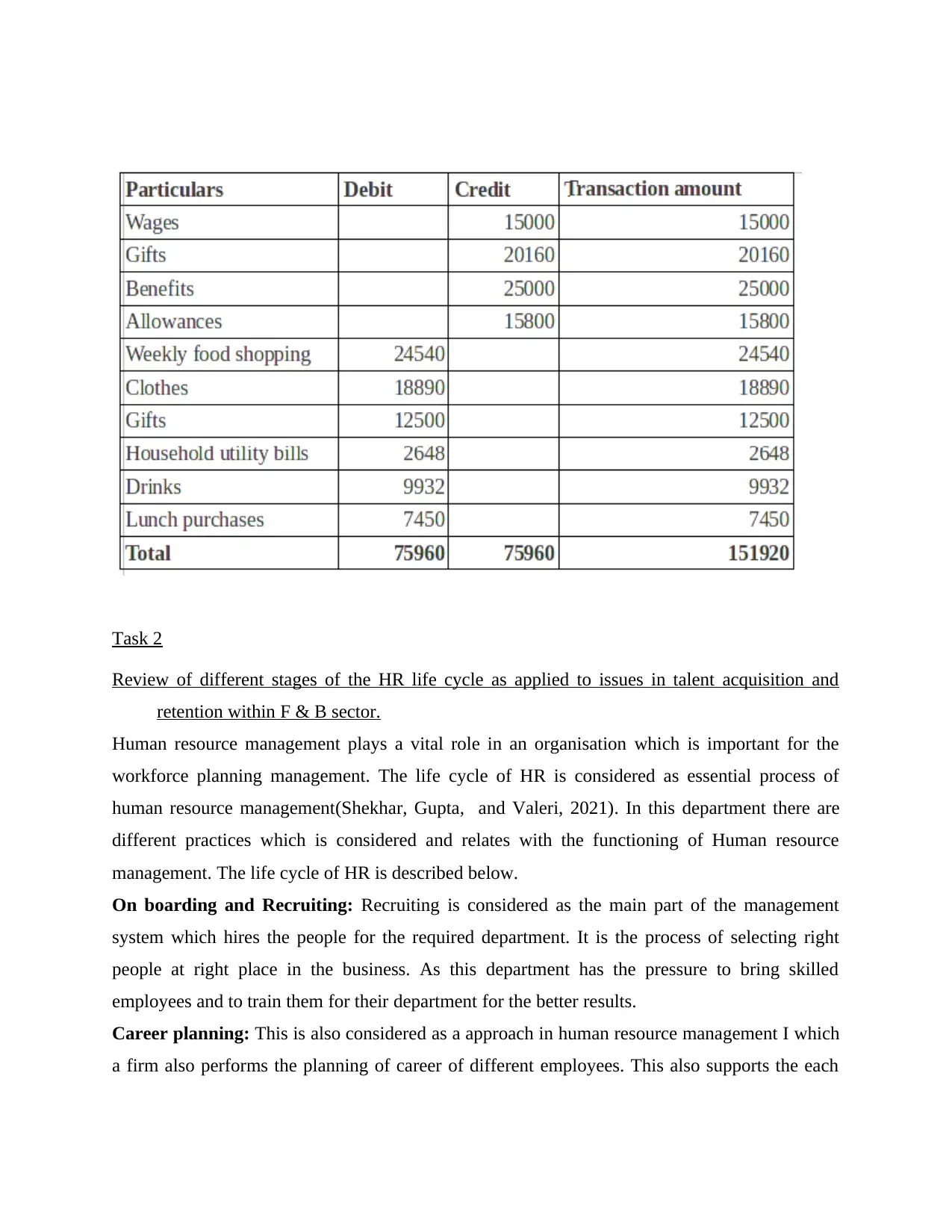
Task 2
Review of different stages of the HR life cycle as applied to issues in talent acquisition and
retention within F & B sector.
Human resource management plays a vital role in an organisation which is important for the
workforce planning management. The life cycle of HR is considered as essential process of
human resource management(Shekhar, Gupta, and Valeri, 2021). In this department there are
different practices which is considered and relates with the functioning of Human resource
management. The life cycle of HR is described below.
On boarding and Recruiting: Recruiting is considered as the main part of the management
system which hires the people for the required department. It is the process of selecting right
people at right place in the business. As this department has the pressure to bring skilled
employees and to train them for their department for the better results.
Career planning: This is also considered as a approach in human resource management I which
a firm also performs the planning of career of different employees. This also supports the each
Review of different stages of the HR life cycle as applied to issues in talent acquisition and
retention within F & B sector.
Human resource management plays a vital role in an organisation which is important for the
workforce planning management. The life cycle of HR is considered as essential process of
human resource management(Shekhar, Gupta, and Valeri, 2021). In this department there are
different practices which is considered and relates with the functioning of Human resource
management. The life cycle of HR is described below.
On boarding and Recruiting: Recruiting is considered as the main part of the management
system which hires the people for the required department. It is the process of selecting right
people at right place in the business. As this department has the pressure to bring skilled
employees and to train them for their department for the better results.
Career planning: This is also considered as a approach in human resource management I which
a firm also performs the planning of career of different employees. This also supports the each
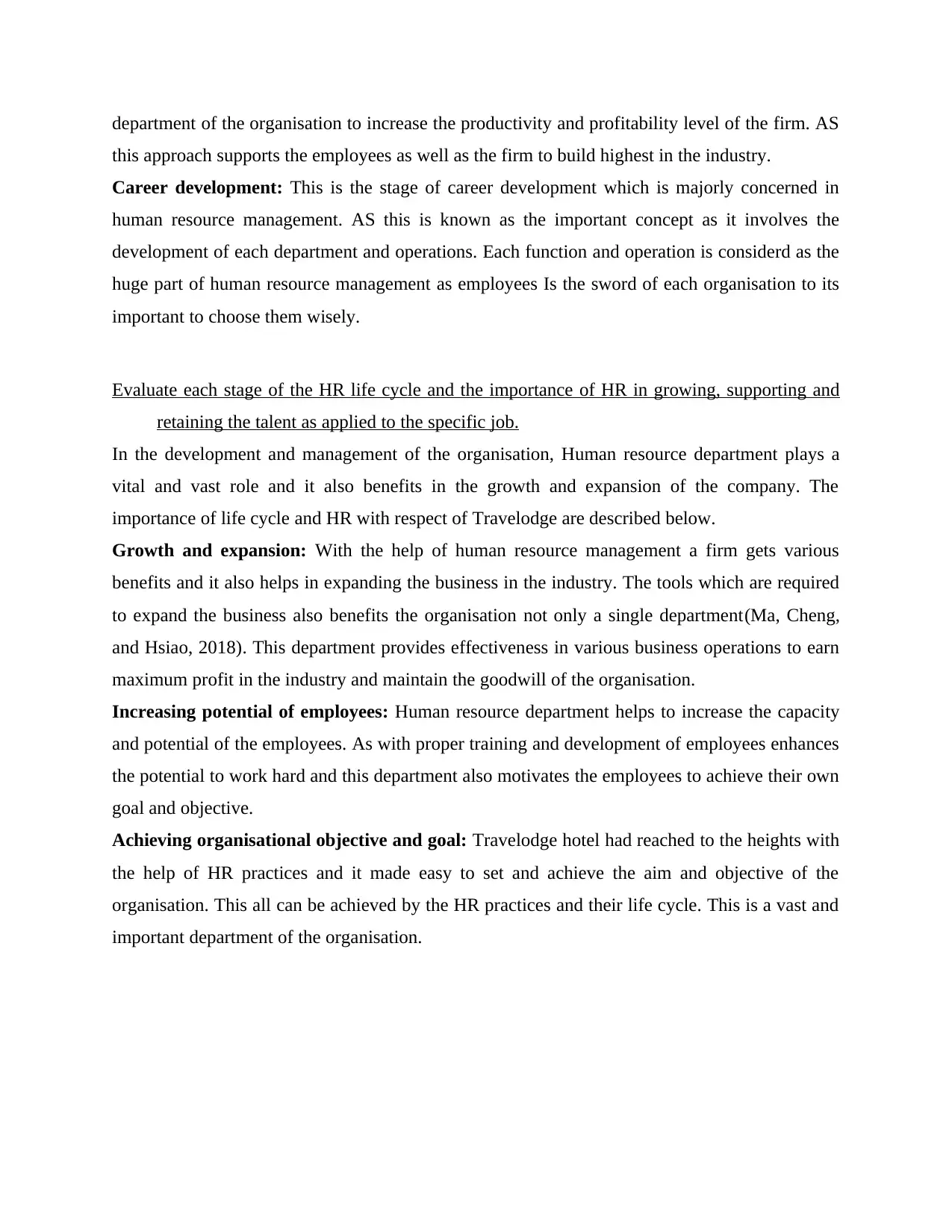
department of the organisation to increase the productivity and profitability level of the firm. AS
this approach supports the employees as well as the firm to build highest in the industry.
Career development: This is the stage of career development which is majorly concerned in
human resource management. AS this is known as the important concept as it involves the
development of each department and operations. Each function and operation is considerd as the
huge part of human resource management as employees Is the sword of each organisation to its
important to choose them wisely.
Evaluate each stage of the HR life cycle and the importance of HR in growing, supporting and
retaining the talent as applied to the specific job.
In the development and management of the organisation, Human resource department plays a
vital and vast role and it also benefits in the growth and expansion of the company. The
importance of life cycle and HR with respect of Travelodge are described below.
Growth and expansion: With the help of human resource management a firm gets various
benefits and it also helps in expanding the business in the industry. The tools which are required
to expand the business also benefits the organisation not only a single department(Ma, Cheng,
and Hsiao, 2018). This department provides effectiveness in various business operations to earn
maximum profit in the industry and maintain the goodwill of the organisation.
Increasing potential of employees: Human resource department helps to increase the capacity
and potential of the employees. As with proper training and development of employees enhances
the potential to work hard and this department also motivates the employees to achieve their own
goal and objective.
Achieving organisational objective and goal: Travelodge hotel had reached to the heights with
the help of HR practices and it made easy to set and achieve the aim and objective of the
organisation. This all can be achieved by the HR practices and their life cycle. This is a vast and
important department of the organisation.
this approach supports the employees as well as the firm to build highest in the industry.
Career development: This is the stage of career development which is majorly concerned in
human resource management. AS this is known as the important concept as it involves the
development of each department and operations. Each function and operation is considerd as the
huge part of human resource management as employees Is the sword of each organisation to its
important to choose them wisely.
Evaluate each stage of the HR life cycle and the importance of HR in growing, supporting and
retaining the talent as applied to the specific job.
In the development and management of the organisation, Human resource department plays a
vital and vast role and it also benefits in the growth and expansion of the company. The
importance of life cycle and HR with respect of Travelodge are described below.
Growth and expansion: With the help of human resource management a firm gets various
benefits and it also helps in expanding the business in the industry. The tools which are required
to expand the business also benefits the organisation not only a single department(Ma, Cheng,
and Hsiao, 2018). This department provides effectiveness in various business operations to earn
maximum profit in the industry and maintain the goodwill of the organisation.
Increasing potential of employees: Human resource department helps to increase the capacity
and potential of the employees. As with proper training and development of employees enhances
the potential to work hard and this department also motivates the employees to achieve their own
goal and objective.
Achieving organisational objective and goal: Travelodge hotel had reached to the heights with
the help of HR practices and it made easy to set and achieve the aim and objective of the
organisation. This all can be achieved by the HR practices and their life cycle. This is a vast and
important department of the organisation.
⊘ This is a preview!⊘
Do you want full access?
Subscribe today to unlock all pages.

Trusted by 1+ million students worldwide
1 out of 19
Related Documents
Your All-in-One AI-Powered Toolkit for Academic Success.
+13062052269
info@desklib.com
Available 24*7 on WhatsApp / Email
![[object Object]](/_next/static/media/star-bottom.7253800d.svg)
Unlock your academic potential
Copyright © 2020–2026 A2Z Services. All Rights Reserved. Developed and managed by ZUCOL.


